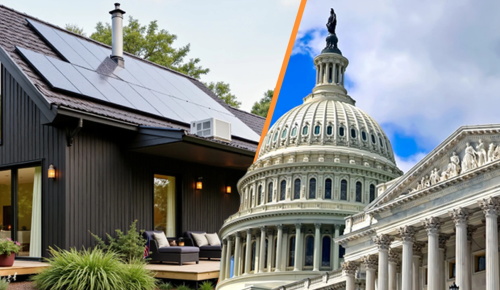US House Passes Republican Bill to End EV Tax Credits Early, Triggering Industry Shockwaves

The US electric vehicle tax credit policy has come to a sudden halt, and the Republican bill has caused an industrial earthquake
On May 22, 2025, the US House of Representatives passed a subversive tax reform bill by a narrow margin of 215 votes to 214, which will end the electric vehicle tax credit policy six years ahead of schedule.
According to the bill, the $7,500 federal tax credit that American consumers can enjoy when purchasing new electric vehicles will be officially canceled on December 31, 2025, and the $4,000 credit for purchasing used electric vehicles will also be terminated at the same time. Only small electric vehicle manufacturers with annual sales of less than 200,000 vehicles can get a one-year grace period.
This legislation, called the "2024 Ending China's Electric Vehicle Dominance in the United States Act", marks a fundamental shift in US electric vehicle policy. The bill not only cancels consumer car purchase subsidies, but also abolishes a series of key policies that support the transition to clean energy.
For automakers, the most direct blow is that mainstream automakers with sales of more than 200,000 vehicles will immediately lose their tax incentives. According to the proposal, the credit for used electric vehicles put into use after the end of 2025 will be terminated directly, and the credit for new vehicles put into use after the end of 2026 will also be canceled.
The current policy was originally established under the 2022 Inflation Reduction Act and was originally scheduled to last until 2032. The Congressional Budget Office initially estimated the cost at $12.5 billion, but the actual implementation far exceeded expectations-the Treasury Department has issued more than $2 billion in tax credits in 2024 alone.
The bill also plans to cancel corporate average fuel economy standards and greenhouse gas emissions regulations from 2027, while terminating the advanced technology vehicle manufacturing loan program. This decision directly affects the billions of dollars in factory construction loans that automakers such as Ford, Stellantis and Rivian have obtained.
According to a Harvard University study, the elimination of the electric vehicle tax credit will free up $168.5 billion in fiscal space for the federal government over a decade.
In the House vote, the voting results were strictly divided along party lines. The vote on May 22 was a narrow 215:214, while the vote on a similar bill last September was 217:192. In both votes, the Democratic Party was almost unanimously opposed, and there were also divisions within the Republican Party.
The White House Office of Management and Budget has issued a statement opposing the bill, arguing that it adds "new, unclear, and unworkable restrictions" to tax breaks, which is actually punishing American consumers and automakers.
Princeton University's forecast paints a more severe picture: without consumer tax credits, battery electric vehicle sales could fall by 40% by 2030, resulting in a reduction of 8.3 million electric vehicles on American roads.
At the same time, planned construction and expansion projects for electric vehicle and battery assembly in the United States, as well as half of the existing assembly capacity, may face the risk of cancellation or closure.







